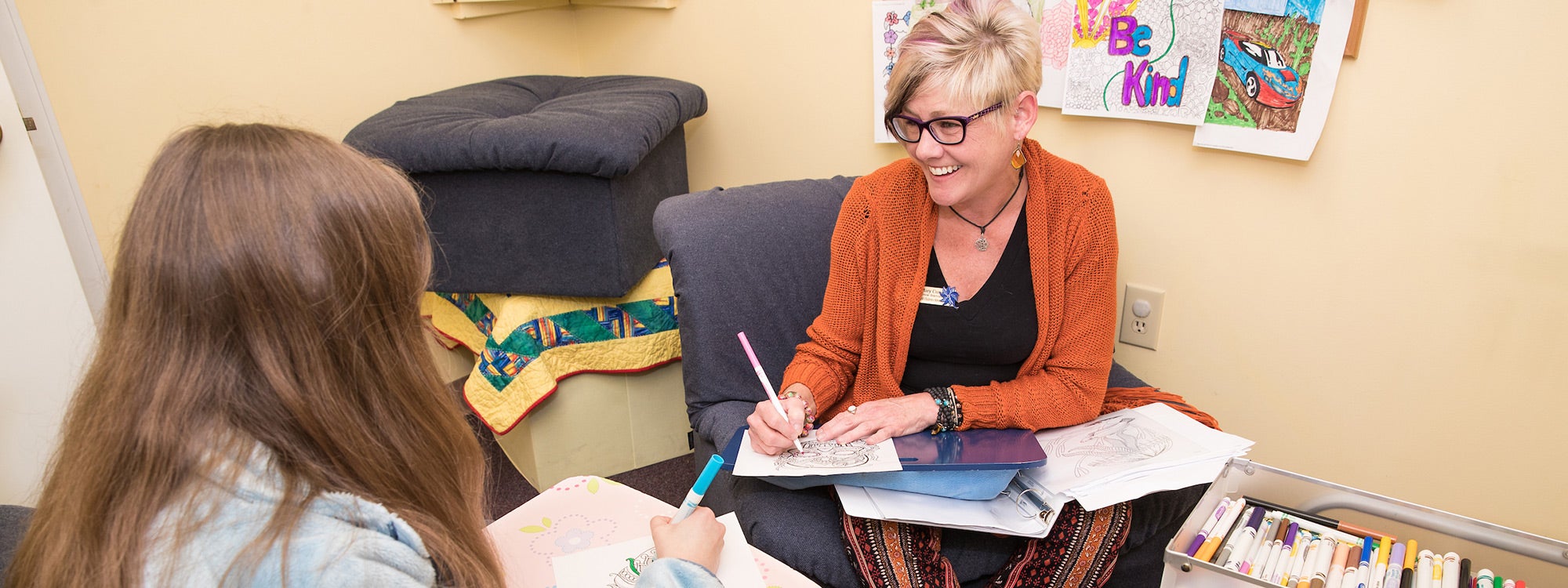BEAR HUGS
ECU child advocacy center awarded landmark grant
East Carolina University’s TEDI BEAR Child Advocacy Center was recently awarded a landmark $1.2 million grant to further its efforts in aiding adolescent victims of abuse. The grant comes from the Governor’s Crime Commission/Victims of Crime Act (VOCA), which is funded through fines imposed on convicted federal offenders, and will help fund current projects and new staff members for the center.
TEDI BEAR stands for Tender Evaluation, Diagnosis and Intervention for a BEtter Abuse Response. The clinic is a partnership between the Department of Pediatrics at the Brody School of Medicine and the James and Connie Maynard Children’s Hospital at Vidant Medical Center.
The largest center of its kind in the state, it provides a child-friendly environment to help heal the trauma that typically accompanies abuse or neglect. More than 20 counties in eastern North Carolina benefit from the clinic’s services.
“These new VOCA funds are essential to help maintain the work of TEDI BEAR,” said Dr. Jason Higginson, chair of pediatrics at Brody. “We rely on this funding to ensure child victims and their non-offending caregivers have multidisciplinary system collaboration before, during and after the provision of services – which include child and family advocacy, medical evaluations, therapy and interagency case review.”
An increase in staff members at the clinic is critical and will reduce wait times for patients seeking care, said Julie Gill, the director of TEDI BEAR. One of the new positions will work specifically with the parents of victims, rather than focusing directly on the victims themselves.

Mental health therapist Wendy Shouse, left, and family advocate Latoya Mobley sort through pinwheels at the TEDI BEAR Children’s Advocacy Center. The center plants the pinwheels along sidewalks to promote Child Abuse Prevention Month every April.
“The new language is ‘two generation interventions’ in child maltreatment,” said Gill. “Meaning, we can work with a kid all day and do great work, but if they go home to an environment that is not supportive, the child is only going to do so well.”
Gill said the clinic already works extensively with parents to discuss the child’s trauma and the special needs that may result from it, but parents aren’t given the opportunity to talk through any of their own potential abuse or trauma. The addition of a parent therapist would drastically change that.
“Sadly, many of our parents have their own stories of being childhood or adulthood victims of violence or sexual assault, and now their child is going through it too. That can trigger a lot of emotions,” said Gill. “And the other side of it is that when children are victimized, the non-offending caregiver is victimized too. It’s such a violation of trust and it’s horrifying that the person you trusted manipulated and used you to access your child.”
Gill said she hopes that providing a more comprehensive assessment and treatment to parents will ultimately end up benefitting the children as well.
“A lot of research shows that if the parents are well, the kids will be well,” she said. “When parents thrive, kids thrive.”
Currently, patients are referred to the clinic by either the Department of Social Services, law enforcement or medical staff at Vidant Medical Center. Caregivers, teachers or other medical professionals may refer patients to TEDI BEAR for mental health services and therapy after an investigation has been conducted.
Between July 2016 and June 2017, there were 120,000 investigated cases of child abuse in North Carolina. Signs of child abuse can vary depending on the type of maltreatment. For a list of potential warning signs visit http://www.ecu.edu/cs-dhs/tedibear/abuse.cfm.
If you would like to report a case of suspected child abuse, visit http://www.ecu.edu/cs-dhs/tedibear/upload/How-to-Report-Suspected-Child-Abuse-Pitt.pdf to learn how.

Each child that comes through the center receives a donated teddy bear.
